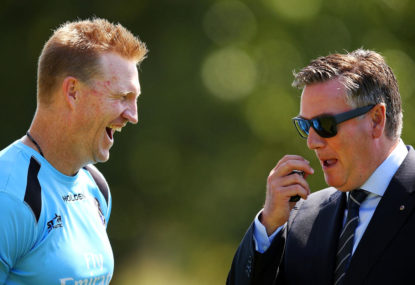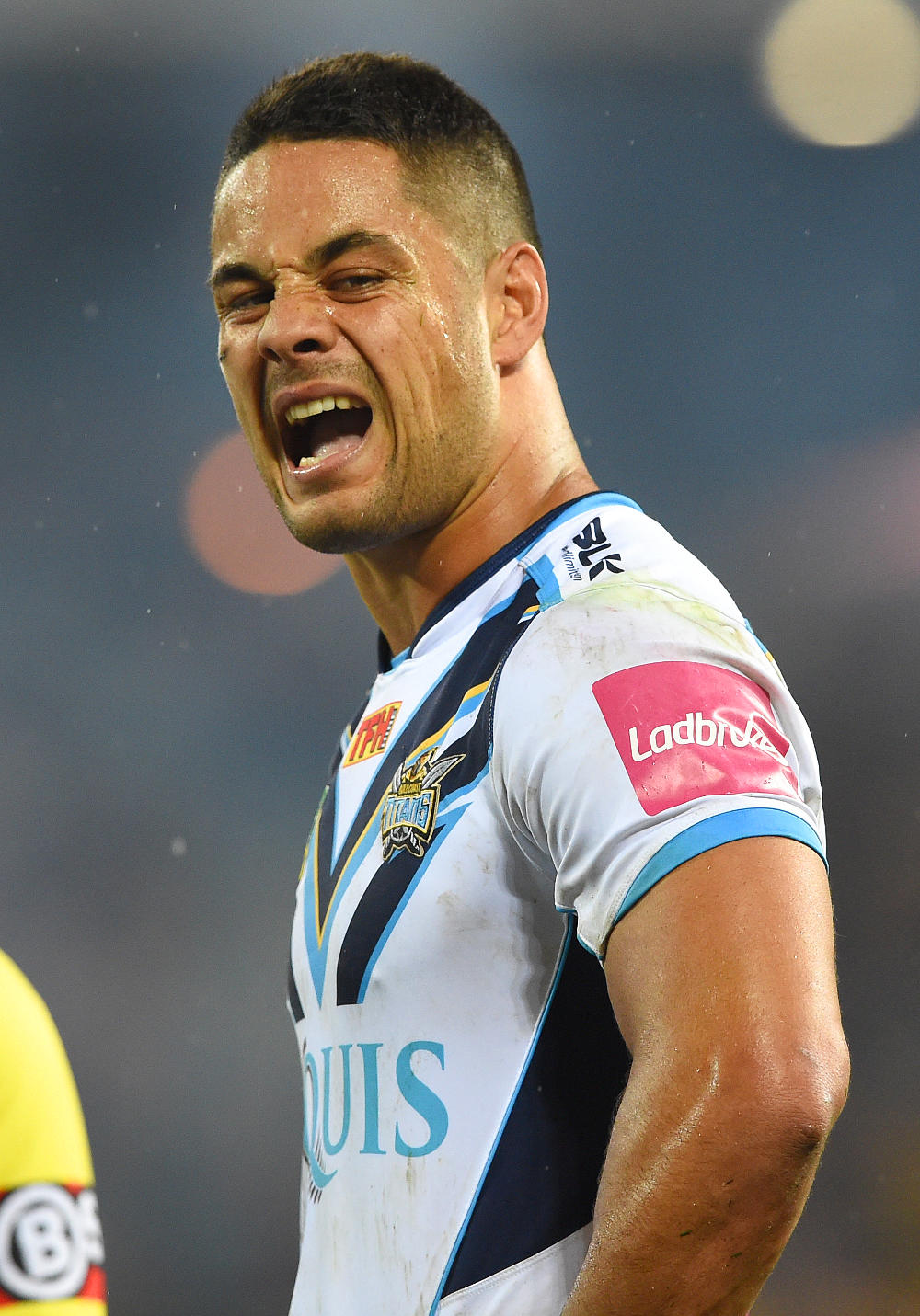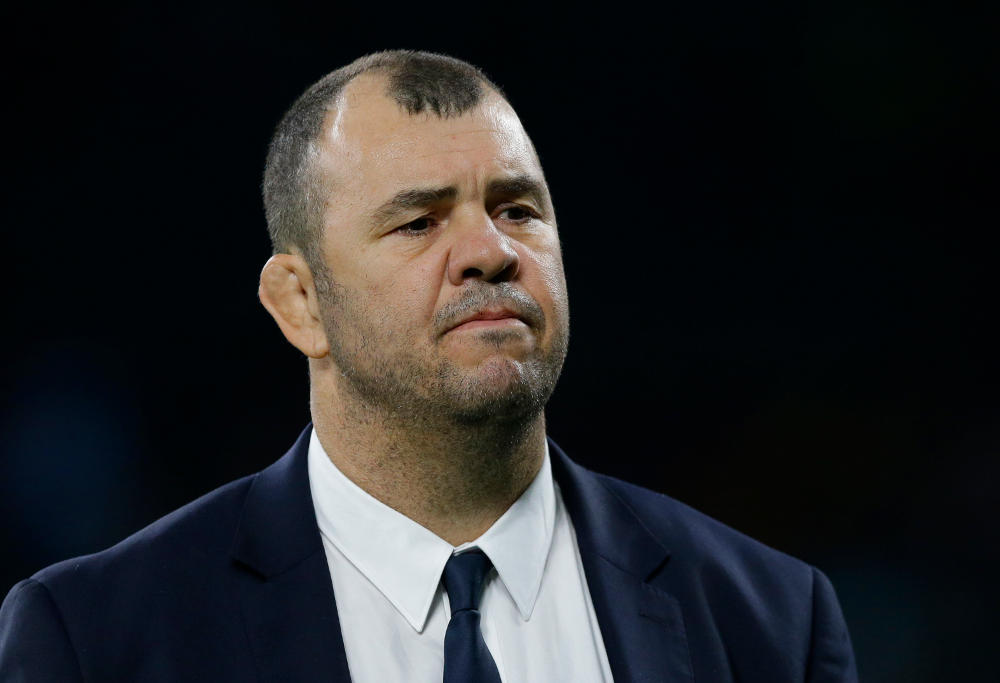'How about the smirk!' Brad Scott's amusing reaction to THAT last-second controversy
Brad Scott told journalists while the focus will be on the final play, he could cite a couple of other decisions that didn't go…

Eddie McGuire has stated that there is only one reason to sack a coach. This of course complements his well-known view that there are zero reasons to replace a club president.
But McGuire’s comment that “the only time that you sack a coach is if you’ve lost the players completely or there is something untoward that needs to be addressed” (OK, that’s actually two reasons, but let’s not nitpick) raises interesting questions about the world of coaching in general.
Across all sports, McGuire’s view is clearly not in the majority. Clubs and boards throughout history have found myriad reasons to sack a coach, from losing too often, to losing only once but particularly badly, to insufficient development of younger players, to inadequate media profile, to old age, to lack of anything better to do on a Wednesday.
In fact, it was just a few years ago that McGuire himself found an interesting reason to sack a coach: his buddy wanted the job instead and Eddie reckoned it was his turn.
It is not fun being a coach, and it’s easy to feel sorry for the poor bastards who do the job – although one must keep in mind that they wanted to do it, probably campaigned desperately for the chance, and really deserve everything they get if they’re dumb enough to bring all that down on themselves by choice.
Nevertheless, it’s a tough row to hoe. As a rule, the coach wears disproportionate blame for their team’s failures, because they are easier to target and get rid of than underperforming players. Sitting apart from the playing group, the head coach finds no safety in numbers, and critics, whether they be fans, media or administrators, have no trouble drawing a bead on the boss.
It’s a sad fact of coaching life that players lose as a team, but the coach loses alone.
[latest_videos_strip category=”afl” name=”AFL”]
The other problem is that nobody ever really knows how good a coach is. That’s why McGuire’s philosophy, if not one he’s always stuck to himself, is a reasonable one: how the players respond to a coach is one of the few performance indicators that can actually be assessed.
Some will try to tell you that the measure of a coach is in wins and losses. Some will even hire and fire coaches on that basis. It’s nonsense, obviously: a coach’s job is not to win, but to maximise the resources at his or her disposal.
It’s a curious coincidence that when you look through the lists of legendary coaches, there tend to be a lot of legendary players under their tutelage. But do the coaches look good because of the players, or do the players become great through skilful coaching? Nobody knows.
Nobody knows, when they watch their team play, whether they’re playing brilliantly because of the coach or in spite of them. Nobody knows if the hapless incompetence of a cellar-dwelling rabble is due to the coach’s inability to formulate a decent plan, or the players’ inability to execute one.
And if the players can’t follow instructions, nobody knows whether that’s because the coach lacks communication skills, or because the players are simply cloth-eared cretins.
Only those in the inner sanctum of a club even know what a coach does. Most of a coach’s work is not done in public on game day, it’s done during the week, in the pre-season, on the training track and behind closed doors in team meetings, strategy sessions and recruitment.
Even those who get to observe the internal workings of the team may not truly appreciate what the coach is doing, because the most important location of a coach’s labour is between each player’s ears.
Between Jarryd Hayne’s ears there seems to be a certain amount of resentment for Neil Henry, and that’s why Henry is no longer chief of the Titans. This is a variant of McGuire’s declaration that you only sack a coach when he’s lost the player.: Graeme Annesley and his cohorts at Gold Coast decided, not unreasonably, that you only sack a coach when he’s lost one player, and that player costs a lot more than the coach does, and is better at attracting publicity than the coach, and would make your administration look like bloody idiots if he walked.

AAP Image/Dave Hunt
As always, the coach gets the bullet ahead of the players – being a coach means being in charge, but only for as long as the people you’re in charge of want you to be be in charge of them. It’s a particularly ruthless form of democracy.
But if sacking a coach is often attractive because it’s so easy, it’s frequently so easy because it doesn’t really work.
Bob Dwyer once wrote that with a rugby team of 15 men, the coach can be said to be responsible for just one-sixteenth of a side’s performance. In today’s game, maybe that’s blown out to one-twenty-third. Maybe it’s even less – Michael Cheika, and his assistants, have come under the blowtorch for the Wallabies’ almost surreally bad performance against the All Blacks, but what happened on-field provides very little clue as to what they could’ve done differently.
The Australians displayed a disturbing incapacity to tackle, pass and various other rudimentary skills. What can a coach do when players reach international level not knowing how to do these things? Was Cheika supposed to spend his precious preparation time walking his men through the basics of tackling technique?
Should he have spent more time teaching Nick Phipps, the second-best halfback in the country, how to throw a three-metre pass to a teammate under no pressure without sending it flying over his head?
When a man is supposedly good enough to play for his country, a coach is surely entitled to expect a certain baseline of competence. How many international cricket coaches have torn their hair out, knowing they’re going to be blamed for the fact a batsman has somehow made it to the highest level without knowing how to hold their bat straight?
But were these woeful skill errors seen in the Bledisloe actually the result, not of ineptitude, but of a crippling lack of confidence, an attitude problem that a good coach should be able to redress? How would any of us know? All we know is that Australia is nowhere near as good as New Zealand. Whether Michael Cheika has made them worse than they could be is a mystery, and therefore so is whether anyone else could make them better.

AP Photo/Alastair Grant
So does the coach’s curse become, at times, a blessing: nobody appreciates what they do, but at least it makes it hard for them to pinpoint what you’re doing wrong. The Wallabies are woeful; Collingwood is mediocre. Nobody knows whether changing coaches will fix this, so they’ll hold on for now.
Until someone whispers: “He’s lost the players.” Then it’s human cannonball time, as the suits breathe a sigh of relief at the arrival of an excuse to do something that gives the appearance of constructive activity.
And off the sadder and wiser ex-coach will go, into the hellish oblivion of a high-paid, low-pressure media role, to ponder the eternal unanswerable: why did I ever want that shitty job in the first place?